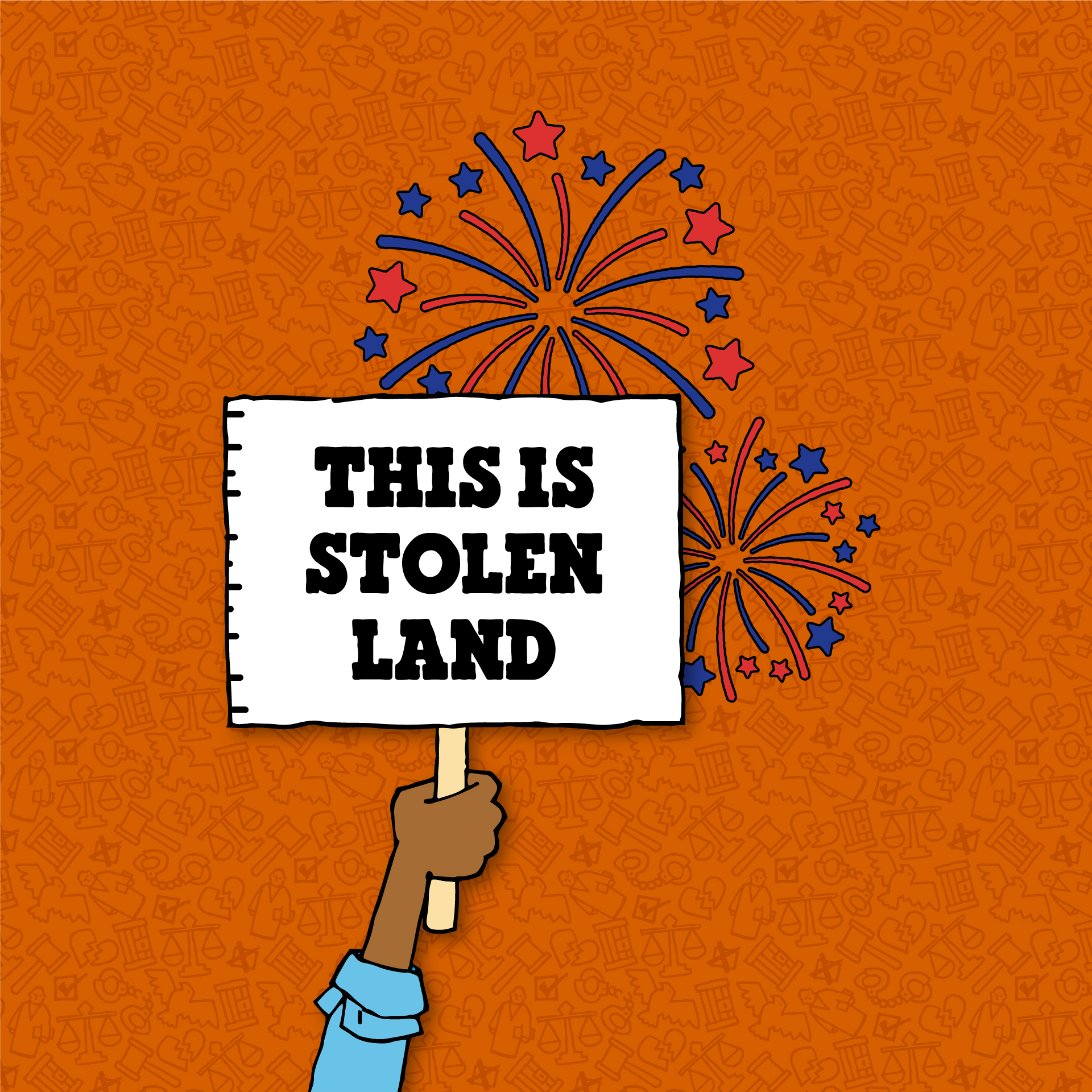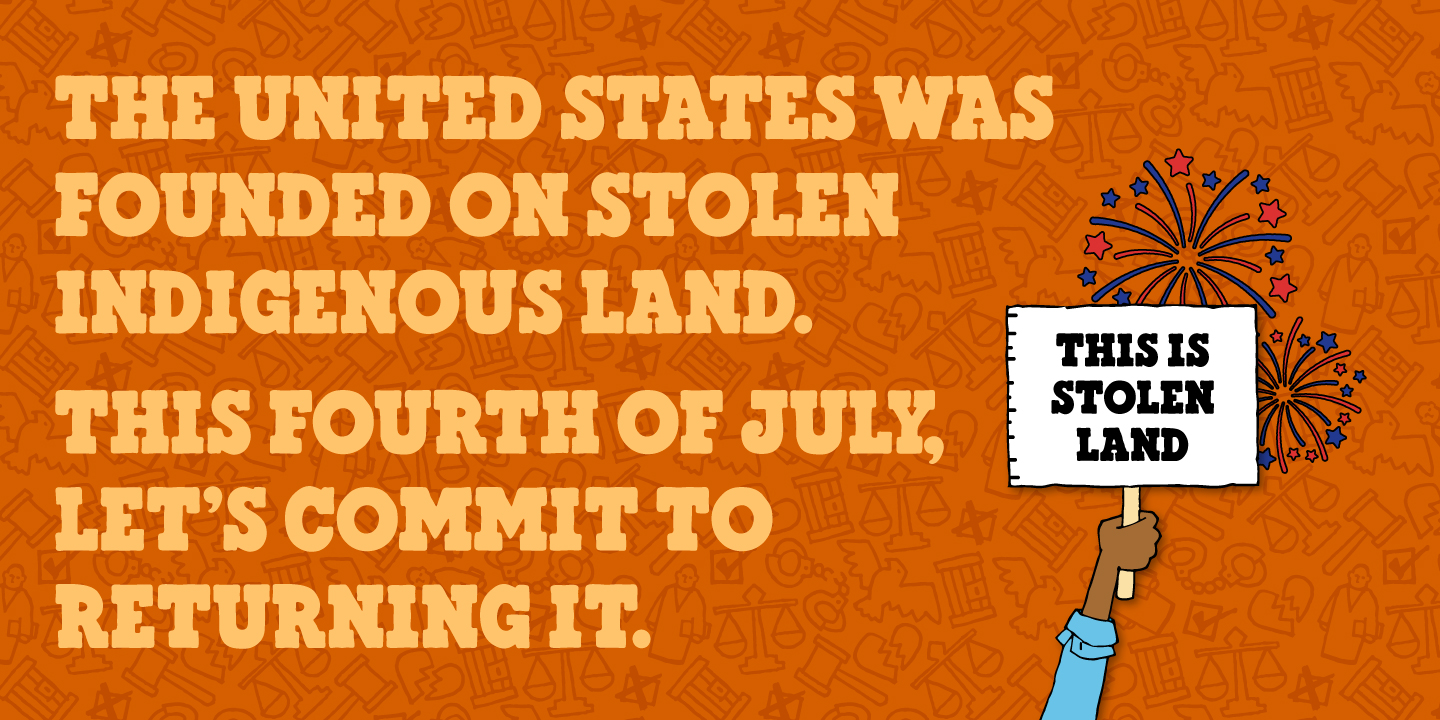
Take Action Now
Return Mount Rushmore and the Black Hills to the Lakota!

Ah, the Fourth of July. Who doesn't love a good parade, some tasty barbecue, and a stirring fireworks display? The only problem with all that, though, is that it can distract from an essential truth about this nation’s birth: The US was founded on stolen Indigenous land.
This year, let’s commit to returning it.
Here’s why we need to start with Mount Rushmore.
When Indigenous leaders blocked the road to Mount Rushmore before an Independence Day celebration in 2020, it highlighted a conflict that most Americans probably know little about.
Long before South Dakota had become a state, long before the faces of four American presidents were blasted into the side of Mount Rushmore, that mountain was known as Tunkasila Sakpe, the Six Grandfathers, to the Lakota Sioux—a holy mountain that rises up from the Black Hills, land they consider sacred.
The Black Hills are known to the Lakota as “the heart of everything that is.” After decades fighting to keep colonizers off their land, the Lakota and other tribes signed the Fort Laramie treaties of 1851 and 1868, establishing a 35-million-acre “permanent home” for them that included the Black Hills.
What’s your definition of “permanent”? Well, to US officials at the time, it apparently was something along the lines of “until gold is discovered.” The government broke those treaties only a few years later, when gold prospectors and settlers flooded in and carved up the land for themselves.

Return Mount Rushmore and the Black Hills to the Lakota!
The Great Sioux Nation, as the tribes in the area were collectively known, was forced to surrender its land and relocate to smaller reservations on land that the government considered “useless.”
From there, in 1927, they watched as their holy mountain, now located on land known as South Dakota, was desecrated and dynamited to honor their colonizers, four white men—two of whom enslaved people and all of whom were hostile to Indigenous people and values.
In 1970, Indigenous activists climbed Mount Rushmore and occupied it for months, demanding that land be returned to the Sioux.
Ten years later, the US Supreme Court ruled that Mount Rushmore and the Black Hills had indeed been stolen, saying “A more ripe and rank case of dishonorable dealings will never…be found in our history.” They awarded the Sioux $105 million in damages, but the tribes refused the payment. Why? Because this sacred land is theirs—and it’s not for sale.
That money has been held in trust since 1980 and now is worth about $2 billion (with interest). The tribes still refuse it, despite living in some of the poorest communities in the US.
"We are poor because our resources were stolen from us…But our connection to the Black Hills is not a monetary one. Our main concern is that the land not be desecrated and we be allowed to resume our role as stewards of the land—that is our purpose as Lakota."
- Red Dawn Foster, Oglala Lakota, South Dakota state senator
Why are we talking about this? Because on the Fourth of July many people in the US celebrate liberty and independence—our country’s and our own.
But what is the meaning of Independence Day for those whose land this country stole, those who were murdered and forced with brutal violence onto reservations, those who were pushed from their holy places and denied their freedom? The faces on Mount Rushmore are the faces of men who actively worked to destroy Indigenous cultures and ways of life, to deny Indigenous people their basic rights.
The Indigenous-led Land Back movement is all about restoring the rights and freedoms of Indigenous people. It’s about dismantling white supremacy and systems of oppression and ensuring that Indigenous people can again govern the land their communities called home for thousands of years.
The US exists on stolen land. We have to acknowledge that—today and every day.
In the case of Mount Rushmore, the Supreme Court already did!
This Fourth of July, it’s time to return that sacred place to the Lakota. Let’s make it a day that embraces freedom and justice for all.

Return Mount Rushmore and the Black Hills to the Lakota!
Subscribe Now And We'll Make Sure You Get The Inside Scoop On Ben & Jerry's Fun And Flavors! It's Like Dessert For Your Inbox, And You're Going To Want Seconds.